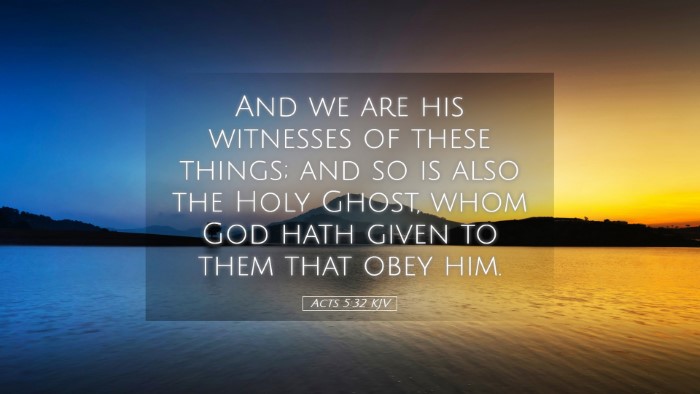Commentary on Acts 5:32
Bible Verse: "And we are his witnesses of these things; and so is also the Holy Ghost, whom God hath given to them that obey him."
Introduction
This passage from the book of Acts presents a profound declaration concerning the role of the apostles as witnesses to the life, death, and resurrection of Jesus Christ, as well as the confirmation of these truths through the Holy Spirit. This commentary synthesizes insights from well-respected public domain commentaries to provide a broader understanding of this verse, aiming to illuminate its significance for contemporary pastors, students, theologians, and Bible scholars.
Contextual Analysis
Acts 5:32 falls within a pivotal moment in the early church's formation, where the apostles are facing opposition from the Jewish authorities who are troubled by their burgeoning influence. This verse functions as a key statement in Peter's defense before the Sanhedrin, declaring not only their role but also the affirmation of the Holy Spirit's work.
Witnesses of These Things
Albert Barnes emphasizes the apostolic calling to witness, noting that this role was distinct and mandated by Christ himself. The apostles were not mere observers; they were commissioned witnesses—participants in the redemptive work of Jesus. The phrase “we are his witnesses” is vital, indicating both authority and responsibility. Peter appeals to the firsthand experiences that the apostles shared with the risen Christ, thus grounding their testimony in credible and divine encounters.
Matthew Henry adds depth to this notion by discussing the transformative experience the apostles underwent after the resurrection. His commentary notes that their previous fear is replaced by boldness due to the empowerment of the Holy Spirit, fulfilling Jesus' promise to be with them. This transition is crucial, as it illustrates the nature of witness not merely as recounting facts but as living a reality changed by their relationship with Christ.
The Role of the Holy Spirit
The latter part of the verse introduces a significant theological element: “and so is also the Holy Ghost.”Adam Clarke elaborates on this, asserting that the Holy Spirit bears witness alongside the apostles. The presence of the Spirit serves as a divine confirmation of the testimony given by the apostles, indicating that the truth of the resurrection and the gospel message extends beyond human testimony to divine validation.
This dual testimony—apostles and Holy Spirit—reflects God's cooperative effort in revealing truth. The Holy Spirit not only empowers the apostles for their mission but also acts as a witness to the hearts of believers, affirming their faith and obedience. Such insights encourage believers to consider the active role of the Spirit in their lives, perpetually guiding and confirming the truths of God’s word.
Obedience to God
Lastly, the phrase “whom God hath given to them that obey him” encapsulates a conditional aspect of the Holy Spirit’s work. Albert Barnes observes that this highlights the relationship between obedience and the reception of the Spirit. The Holy Spirit’s presence is promised to those who are obedient to God’s commands, thereby placing a strong emphasis on the necessity of living a life that is aligned with divine will. This conditionality suggests that the experience of the Spirit is intimately connected to one’s discipleship and loyalty to Christ.
This presents an important theological implication for Christians: the expectation of obedience is rooted in the kerygma of the apostles. Pastors and theologians must stress that faith and obedience are not mutually exclusive but rather part of the same transformational process initiated through the Spirit’s work.
Conclusion
Acts 5:32 powerfully encapsulates the essence of apostolic witness, the Holy Spirit's confirming role, and the call to obedience. The integration of these elements offers a model for understanding the early church's mission and provides a theological framework that is relevant for today's believers. The essence of being a witness is not merely about articulating truths but embodying them through a life of obedience, empowered by the Holy Spirit.
As we reflect on this verse, it becomes imperative for pastors, students, and theologians to foster a culture of witness within the church community—a culture that embraces the transformative power of the Holy Spirit and recognizes the importance of living authentically for Christ. By encouraging obedience to God’s commands, we enable the Holy Spirit to work powerfully within us, fulfilling the commission given by Christ to be His witnesses in all the earth.


